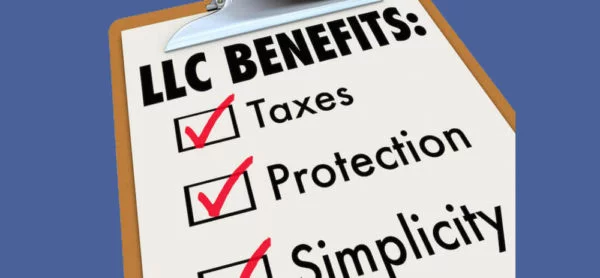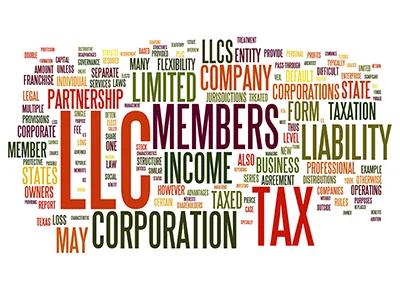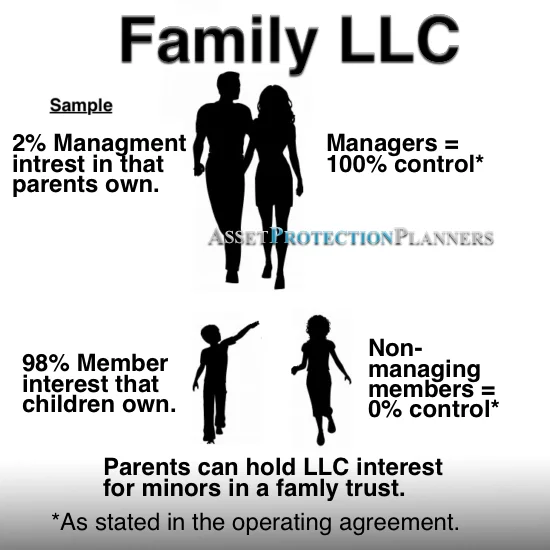Limited Liability Companies are outstanding asset protection vehicles. They can protect the personal assets of the company members (owners) if someone sues the business. Moreover, the LLC can protect the assets of the business when someone sues a member. Thus, it can shield the members from the liability related to business transactions. Plus, when someone sues a member, personally, there are provisions in the law that keep a creditor from seizing the assets inside of the company to satisfy a judgment. LLC’s are exceptionally beneficial when used to safeguard real estate or stock market investments.

A limited liability company (“LLC”) is a non-corporate business entity. When you have one, depending on you structure it, all members can have limited liability protection. Plus, and all members (or one or some) can participate in management and control.
LLC Taxation
In the United States, the LLC gives its members several taxation options. By default, the IRS treats a single member LLC as a sole proprietorship (disregarded entity) for taxation purposes. With two or more members, the IRS recognizes an LLC as a partnership for income tax purposes, by default. You can elect corporation taxation for your LLC if you file an 8832 form. Finally, you may elect S corporation taxation by filing an 8832 form plus a 2553 tax form. By combining limited personal liability with tax flexibility, the limited liability company can provide advantages that are unavailable to corporations, partnerships or limited partnerships.

LLC Protecting Real Estate
The real estate LLC offers asset protection benefits. Coupled with the tax benefits, these features makes it the preferred vehicle for real estate and stock market investments. This is because it combines liability protection with favorable sole proprietorship or partnership tax treatment. Although real estate ownership creates potential liability with tenant and guest injuries, leases, contracts, environmental laws, mortgages and other laws, real estate investors prefer LLCs because they are advantageous when used to own assets that create passive income.

LLC Asset Protection
You can stipulate in the operating agreement how an LLC protects you. It can state that managers have complete control. Then, it can state that members have little to no control. The law generally denies creditors the right to take an interest in the LLC. Plus, if structured with nominee managers in the public records (a service we provide) it can offer great anonymity. LLCs are among the most widely used and effective domestic asset protection tools.

How it Protects Assets
Here is how it protects assets. Let’s say you have a four-member LLC; you, your spouse, and your two children. Alternatively, you could simply have three other friends as business partners. One of the members rear ends someone’s car. The injured driver of the other automobile sues and gets a $1 million judgment. That member only has $500,000 in liability insurance.
Next, the judgment creditor gets a judge to place a charging order on that member’s interested in the LLC. So, let’s say that member owns 25% of the company. The ruling says that all distributions to that member must now go to the creditor. However, LLC statutes do not allow the creditor to step into the shoes of a member or manager and order the payment of distributions. So, the management decides to keep the profits inside of the LLC.

How to Name Your LLC
We have a complete article ideas on how to name a business that has some very good tips. In summary, there are two categories of names. One is where the name really matters, because it supports a brand name, for example. Another is where the name really does not bear much significance. For example an LLC owns a piece of real estate at 123 Main Street. So, you call your LLC 123 Main Street LLC.
For asset protection purposes, we usually suggest not using your own name unless it is part of your business name. Avoiding the use of your own name can help enhance your privacy. We have a free naming tool that you can use in the article referenced above.
The Fun Part
Now, here is the fun part. According to Revenue Ruling 77-137, whoever has the right to the distributions must pay taxes on them. They must pay taxes on the profits whether they receive the distributions or not. So, even if the managers keep the profits locked up in the company, the members still need to pay the tax. What that means, is that now the creditor receives a tax bill…but no money. You read that right. Operated properly, the one who holds the charging order gets a tax bill but they do not get any money to pay it.
The charging order rules also state that the creditor cannot readily take the member’s share in the LLC. Nor can they take the assets inside of the entity.

Why Wyoming LLC?
As of this writing, in 47 states you must have two or more members in order to enjoy charging order protection. According to our research, only Wyoming, Nevada and Delaware statutorily give charging order protection to one-person LLCs. Wyoming is the most cost-effective because the annual renewal fees are far lower. So, all things considered, we like Wyoming as the preferred option.

Taxes and LLCs
As stated, an LLC is, by default, classified as a sole proprietorship or partnership for income tax purposes. Therefore, income, gains, losses, deductions, and credits flow through to its members. With this arrangement, there is no tax at the company level.
There are no major differences in the income tax treatment of LLC’s that are taxed as a partnership or the taxation of limited partnerships. The principal advantage of the LLC over the limited partnership is the limited liability protection afforded to all members and managers. Limited Partnerships, on the other hand, have one or more general partners. These partners are personally liable for partnership debts and obligations. The LLC affords lawsuit protection when someone sues the company. It provides this protection even for the its managers. Plus, it offers asset protection services to its members regardless of the extent to which they participate in management and control of the company’s business affairs.

Family LLC
A family LLC is a limited liability company that family members own. For example, children can own majority of the company as non managing members. The parents, in turn, manage the company, so have 100% control. These stipulations are written in the operating agreement. LLCs are so flexible that they can be used for estate planning purposes. Also in the operating agreement, non managing members may become managers upon the incapacity or death of the parents. Instead of transferring assets traditionally, the LLC can virtually eliminate death taxes. Moreover, you can establish limited liability company with perpetual duration. Therefore, it can provide security for generations to come. The family LLC is superior to the family limited partnership because with the FLP the general partner is vulnerable to lawsuits against the entity. The Family LLC, on the other hand, protects the company managers.



